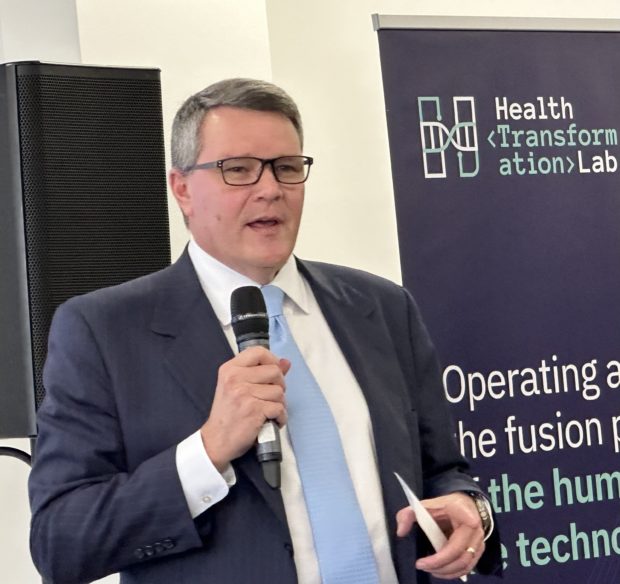
Guy Diedrich–Photo by Doris Dumlao-Abadilla
MELBOURNE, Australia— With the world facing a shortage of technology professionals, global tech conglomerate Cisco has committed to equip 6.7 million Asia-Pacific students with digital and cybersecurity skills over the next 10 years.
Announced at the Cisco Live Melbourne conference on Thursday, the training program will be done through the 25-year-old Cisco Networking Academy, one of the world’s longest running skills-to-jobs initiative of its kind, offering technology education through public-private partnerships alongside workforce development.
The World Economic Forum earlier estimated that between now and 2025, digitalization would displace 85 million workers. But at the same time, the digital age is projected to create 97 million new jobs that require new skill sets related to the digital economy.
“So our obligation as industry professionals, as governments, as academics, is to retrain, reskill 85 million people so that they go from jobs that are now obsolete to jobs that are going to be prosperous and productive for the next 25 years,” Guy Diedrich, Cisco senior vice president and global innovation officer, told visiting journalists and analysts.
The briefing was held at RMIT University, one of Cisco’s partner-universities, where new technologies to improve healthcare are being developed.
“If you look at the dearth of trained cybersecurity professionals alone, you get an idea of the scope of the problem. There are today 3.4 million unfilled cybersecurity jobs globally. So when we talk about 6.7 million to train, we’re gonna help close that gap,” Diedrich said.
Cisco is keen on training not just cybersecurity professionals but also networking, artificial intelligence, machine learning, programming, data analytics and data science professionals.
Investing in technology, human capital
To date, Cisco helps various governments execute their national digital agenda through its Country Digital Acceleration Program.
“Our purpose is powering an inclusive future for all, and how we do that manifests itself in different ways around the world. But everywhere where we operate, we try to have country impact strategies that are aligned [with] the national agenda and allow us to be partners with the governments,” said Dominic Scott, Cisco vice president for Asia-Pacific government affairs.
The Networking Academy program complements such digital acceleration program.
“If you invest only in technology and not in the intellectual capital to execute on that technology, you’re throwing money down a technology black hole,” Diedrich said.
Globally, the Networking Academy program has reached 17.5 million students across 190 countries. Since starting operations in Asia-Pacific, the program has spread to 34 markets and trained nearly 4.5 million students through 1,950 partnerships with institutes of higher learning and organizations offering Networking Academy courses.
The millions to be trained in the Asia-Pacific region are part of Cisco’s aim to train 25 million students worldwide.
“Digital transformation and technology adoption are transforming economies across the globe. For countries and businesses to fully harness the opportunities that are being created, they need a workforce with adequate skills. As such, building a local pool of next-generation talent is critical to long-term social inclusion and economic resilience,” he added.
Cisco Networking Academy leverages the firm’s industry expertise to deliver information and communications technology, cloud-based curriculum alongside tools focused on technologies shaping the future such as security, networking, collaboration and internet of things . Courses are designed with a learning science foundation, integrated with gamification, assessments and problem-solving to support learner success.
Over the years, 97 percent of students surveyed in the region who had taken Cisco certification-aligned courses obtained jobs or educational opportunities.
A dog-like robot named “Spot” can fetch medicine and other urgent provisions needed by bed-ridden or physically-challenged patients–Contributed photo
RMIT partnership
The briefing was held at RMIT University, home of the Health Transformation Lab, which is anchor-funded by Cisco.
Vishaal Kishore, professor of innovation and public policy at RMIT University and a former Australian deputy health secretary, said the lab was fast becoming the place where Australian and healthcare systems across the region “come to be provoked to think about their hardest problems at the interface of the human and the technological and at the borderline of today and tomorrow.” It’s based on some of the works at the MIT Lab which were “looking at the technologies that will change the world,” he added.
The lab demonstrated some of the prototypes under development in its health-scare sandbox, including a “smart” room system that can detect elderly people who may trip and fall while alone and a dog-like robot named “Spot” who can fetch medicine and other urgent provisions needed by bed-ridden or physically-challenged patients. Spot is seen to enable contact-free delivery of medical supplies especially to patients with communicable diseases.
“Spot is the newest member of the Health Transformation Lab team and perhaps the highest demand actor at the moment,” said Nithya Solomon, director for policy, strategy and impact at RMIT University.
“Robotics is so squarely within health lab right now and is equally one of the technologies to be considered in terms of reimagining and redesigning for technology and technology solutions within within the aged care system,” she said. INQ